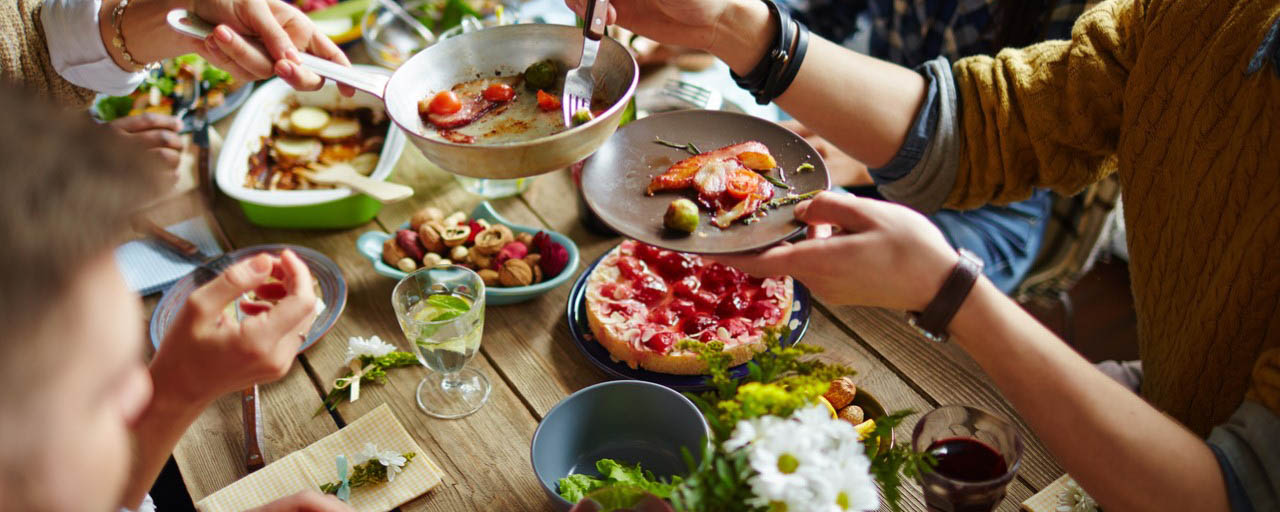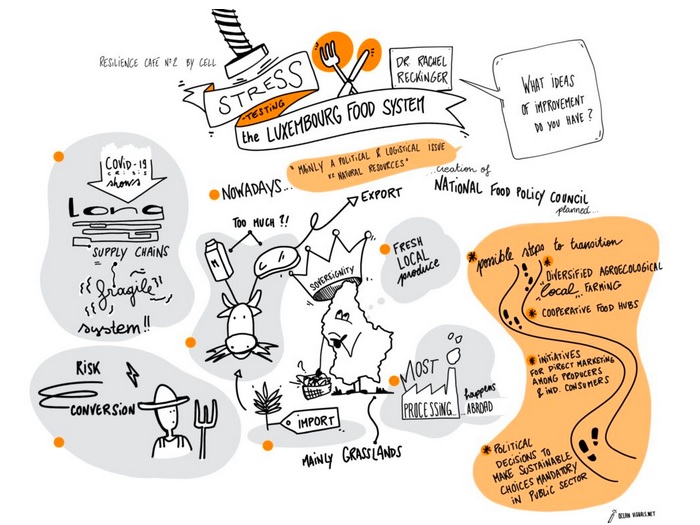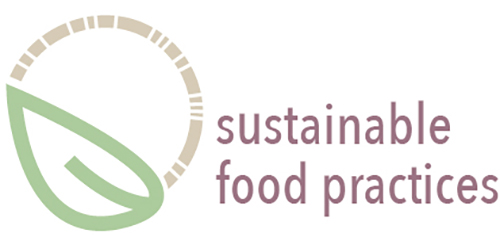
Resilience Café: “How resilient is Luxembourg’s food system?”
Thursday 16th April 2020
The second Résilience café took place on Thursday April 16, 2020 and focused on food. Dr. Rachel Reckinger, University of Luxembourg, presented the session on stress-testing the Luxembourg food system.
You can view the video on the CELL YouTube channel.

Graphic Recording CC BY-ND Caroline Schuler, 04.202
Abstract
In this particularly stressful period for our societies, the Centre for Ecological Learning Luxembourg (CELL, the Luxembourg Transition hub) is starting a series of Transition Cafes & Talks about resilience. As change is happening, what would be the next steps to build up/increase the resilience of our societies globally, but also at your doorstep? This series of Zoom talks and exchanges is made for you: to be a space for connection, disruptive thinking and exchange of very concrete ideas and information.
In this second Resilience Café session, Dr. Rachel Reckinger, researcher on sustainable food practices at the University of Luxembourg, will guide us through a number of essential questions, with a specific focus on the Luxembourg food system. What is the impact of the Covid-19 induced stress test, to our society as a whole, on our understanding of our food system’s vulnerability and resourcefulness? Realising now more than ever that the individual and collective food supply is an essential and vital cornerstone, what adaptations are necessary? Who needs to act at what level? How can WE help to adapt the food system as it is to what it should be?
Summary
Luxembourg is very far from self-sufficient in the supply of food. Most of the food sold and consumed here comes from abroad, with long supply chains and many negative externalities. The impact of this type of food is immense ecologically and socially.
In addition, most of the food production is not very diversified in Luxembourg: the country produces a lot of meat and milk, but produces very few fruits, vegetables and chicken. The challenge here is to diversify production, while organising distribution networks into shorter food supply chains, and greater ease of establishment in terms of land, wages, promotion of trades etc., and by promoting regenerative agriculture.
There are already some initiatives in the direction of buying high quality local produce and from short food supply chains in Luxembourg. Growing your food is also possible in gardens and in one of the many community gardens in Luxembourg. Initiatives around learning to cook and techniques for preserving garden products exist and can be broadened. The quality component is also important: education on the quality of the products and ingredients may be necessary for showcasing traditional sourdough bread made with local seeds, a tasty seasonal tomato, an artisan cheese… Knowledge of wild plants is also a skill that a certain number of people can offer in Luxembourg.
For ethical consumption, it is important to publicise responsible food initiatives. Examples of some websites that provide maps of initiatives: SOS Hungry with “Let’s change the menu” the sites Falling Fruit and Mundraub which list the places where to harvest food in the wild, Eise Gaart, which lists community gardens. You can find out about these through word of mouth and cultural events too. At least two co-operative stores exist in Luxembourg: OUNI which aim is zero waste, and Altercoop which is a consumers’ cooperative of short food supply chains.
The issue of food waste was also discussed in this Resilience Café forum, with several proposals. One of the options is to play on individual consumption by promoting culinary techniques. A second would be to set up workshops in canning, to allow producers to offer preserved products harvested in season. The impact of our food must be shown, with initiatives such as the visualisation of its carbon footprint, the social impact, people’s working conditions, water consumption and negative externalities. We welcome political incentives at large-scale production/sales locations and collective catering locations, with more organic products, management of food and organic waste, local and seasonal consumption, etc.
The original text was written in French by Marine Henry for the CELL website and translated into English for publication here.


